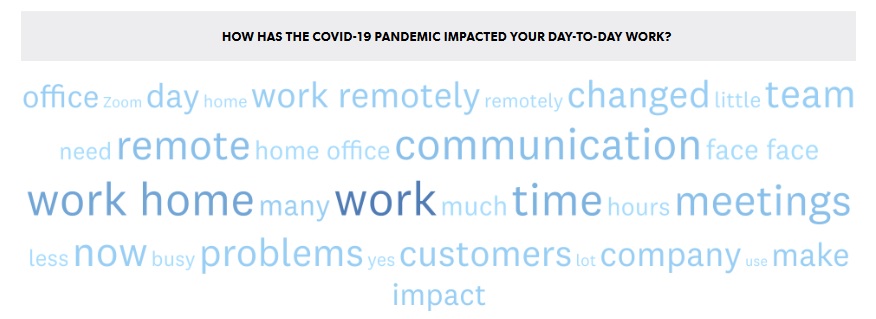Backslash Security introduced its Fix Simulation and AI-powered Attack Path Remediation capabilities.
The COVID-19 pandemic has been a disruptive event for development teams and companies alike, unsurprisingly, according to a recent survey of developers across the world by JRebel by Perforce.
Developers were asked to share the impact COVID-19 has had on themselves, their teams, and their companies. Respondents report working longer hours from home, struggling to maintain good work habits, and eating more comfort food to cope.
On a more positive note, many respondents are spending more time with families or in nature, and reporting even simple things such as noise-cancellation headphones making home-based working easier.

Impact on Hours
91% of developers report that they are working from home (and as early adopters of new ways of working, many developers have already been successfully working from home for years.)
While only 17% reported a drastic impact on their work since the pandemic (with over half of respondents saying that the impact had been moderate), 58% said that they've experienced an increase in hours per week.
While the most-reported increase was between zero and three hours, over 19% reported an increase of over 6 hours per week. It also means that roughly 2% of respondents reported a 6+ hour increase but did not consider that to be a drastic impact on their work.
For developers already putting in long hours pre-COVID, that marks a substantial increase, even a small percentage increase has big implications for busy teams. That said, anecdotal evidence from some survey respondents found that some of the extra time goes into checking "just one more email."
Nearly 56% of companies decreased or froze hiring, 33% decreased contractors
The survey found nearly 56% of companies decreased or stopped hiring during the COVID-19 pandemic, and 33% reported a decrease in the number of staffed contractors. However, that the figures are not higher is a positive surprise: indeed, that over a third report no change in hiring patterns, and almost 60% no changes in contracting.
Key Takeaways
That remote work will remain prominent is no longer news, with more companies expected to embrace decentralized autonomous and fully remote teams for the longer-term.
Reduced overhead and increased pace of innovation will continue to be important points of change for organizations, and the pandemic has been the catalyst for new working models.
Virtual communications is fast becoming the new-norm, together with a shift away from permanent office space to "hoteling" options.
For instance, development teams have been trending smaller for some time now, but COVID-19 has clearly shown the importance of having small, agile teams.
Also, widespread access to new cloud, open source, VR, and AI technologies will mean smaller teams can compete side by side with much larger organizations.
2020 has been tough, with organizations of all kinds having to accelerate digital transformation and rapidly reinvent how they operate. Getting the foundations in place now for a more flexible modern workplace puts the IT community in good shape to adapt and deal with pandemics and other unforeseen challenges.
Industry News
Check Point® Software Technologies Ltd. announced the appointment of Nadav Zafrir as Check Point Chief Executive Officer.
Sonatype announced that Sonatype SBOM Manager, its Enterprise-Class Software Bill of Materials (SBOM) solution, and its artifact repository manager, Nexus Repository, are now available in AWS Marketplace, a digital catalog with thousands of software listings from independent software vendors that make it easy to find, test, buy, and deploy software that runs on Amazon Web Services (AWS).
Broadcom unveiled the latest updates to VMware Cloud Foundation (VCF), the company’s flagship private cloud platform.
CAST launched CAST SBOM Manager, a new freemium product designed for product owners, release managers, and compliance specialists.
Zesty announced the launch of its Insights and Automation Platform.
Progress announced the availability of Progress® MarkLogic® FastTrack™, a UI toolkit for building data- and search-driven applications to visually explore complex connected data stored in Progress® MarkLogic® platform.
Snowflake will host the Llama 3.1 collection of multilingual open source large language models (LLMs) in Snowflake Cortex AI for enterprises to easily harness and build powerful AI applications at scale.
Secure Code Warrior announced the availability of SCW Trust Agent – a solution that assesses the specific security competencies of developers for every code commit.
GFT launched AI Impact, a new solution that leverages artificial intelligence to eliminate technical debt, increase developer efficiency and automate critical software development processes.
Code Metal announced a $13M seed, led by Shield Capital.
Atlassian Corporation has achieved Federal Risk and Authorization Management Program (FedRAMP) “In Process” status and is now listed on the FedRAMP marketplace.
Check Point® Software Technologies Ltd. announced that it has received a Leader ranking in The Forrester Wave™: Mobile Threat Defense Solutions, Q3 2024 report.
Mission Cloud announced the launch of Mission Cloud Engagements - DevOps, a platform designed to transform how businesses manage and execute their AWS DevOps projects.
Accelario announces the release of its free TDM solution, including database virtualization and data anonymization.




